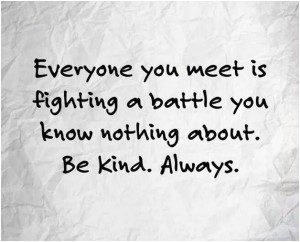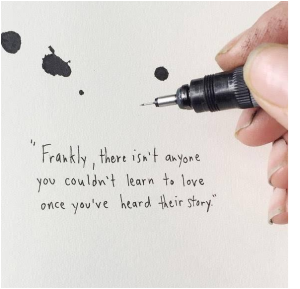I was over at my beloved Some Talk of You and Me last week, writing about realizations, visualizations, and lightbulb moments that had been a long time coming.
If I was vulnerable enough to submit and publish it there, I might as well do the same here…..right…??
It’s Time to Let Go, originally posted on Some Talk of You and Me (edited and formatted by the wonderful Brandie Smith, who continuously gives my words space to be heard):
“This is a perfect example,” I told him.
“I’m fine. My mood is fine, I’m not crying, we’re having a perfectly fine morning. But I feel tight and low in my chest.”
You know how something can happen a million times, but it only clicks when it’s ready?
That’s what happened today. I was on my way to a yoga class and before going into the studio, I took out my phone to type in my thoughts before I lost them.
“Makes me think maybe the heaviness isn’t my mood, doesn’t dictate my mood. Maybe the heaviness isn’t depression. Maybe it’s just all that little kid stuff, that fight or flight, that panic, that decision to stop talking and keep it all in. Maybe I need to talk to it and nurture it.
Tell it,
“I know what you are. It’s okay. You don’t have to be here. I’m taking care of me this time around. You don’t have to hold it in. You’re free to go. I promise.”
This makes me cry.
Maybe so many of the tears are about just that—relief at finally being soothed, relief at not keeping it in, shock over how intense the feelings are that I’ve buried down for months and years and decades.”
—
During an appointment on Friday, we were discussing the physical feelings of the emotions.
I had been so focused on the emotions themselves—the panic, the fear, the shame, the guilt, the despair—but she had been gently encouraging me to go beyond that.
“Where do you feel it in your body?” she asked.
I quickly scanned my body, but knew exactly what I’d fine, knew what I always find:
“Pressure behind my eyes, tightness in my throat, a heavy constriction around my chest, and a pit in my stomach.”
She encouraged me to focus on the tightness in my throat.
“What happens if you focus on it, if you pay attention to it? What purpose do you think it’s serving?”
“It gets worse when I pay attention to it.” I replied.
I thought some more, and then added,
“I think….it’s about fight or flight. It’s the panic, the wanting to fight. I’m a talker and a problem-solver. I like to find solutions right away. But there were no solutions, nothing I could do, or nothing I perceived I could do, so I think the tightness is the words trying to get out—but there are no words. So, it’s some sort of being trapped by silence.”
She suggested I tune into that feeling. I used one of my visualizations—the sparkly white light that clears away murkiness, and tried to clear it away from my throat.
And promptly started crying.
“I have no idea why I’m crying,” I said.
A few moments later, I added,
“It makes me feel young. I mean. I don’t know how to explain it. Um…so, when I imagined the white light coming into clear it away, it felt soothing, like the light was comforting the tightness, telling it that it was free to go, that the light would help, that the tightness didn’t need to hold the burden of solving all of these problems.
And that makes me feel like I would’ve as a little kid.
If I had talked about things, and allowed myself to be soothed and comforted. But, I usually didn’t.
Because, well, bodies didn’t contain emotions for me. Someone else’s feelings just moved right through their body and into mine, and I was maybe even more hypersensitive than I am today. And I had no idea what it was, I was just a little kid, all I knew was that I felt so much all of the time and it made it hard to breathe.
And if I told someone I was sad or upset or having a hard time, I felt their empathy, and it’s good that they felt empathy, because it meant they cared, but then I felt it in addition to my own feelings, and it was too much and hurt even worse than if I hadn’t said anything in the first place.
And so, consciously or subconsciously, probably subconsciously, I decided to stop sharing, to stop reaching out. And I just feel sad about that.
I see the little kids that I work with and I can’t even bear to imagine that one of them would just decide to hold everything in from then on, because they viewed that as the only possible option.”
I paused and took a breath.
“Wow,” she said. “It sounds like maybe you’re grieving. Feeling sadness and grief for the silence you felt you had to undertake.”
—
So, I sat outside the studio and I typed those thoughts into my phone, and I talked to the tightness in my throat like I would to one of my students, and I told it,
It’s okay. You can go. I’ve got this. I’m taking care of me. You don’t have to stay. I know what you are. You are panic and fear and wanting to scream and wanting to run and silence. I know. You can go. It’s okay. I promise.
And slowly, tentatively, it left.
And slowly, tentatively, I allowed it to go.


 at about her but I considered myself privileged to learn more about her personal life.
at about her but I considered myself privileged to learn more about her personal life.